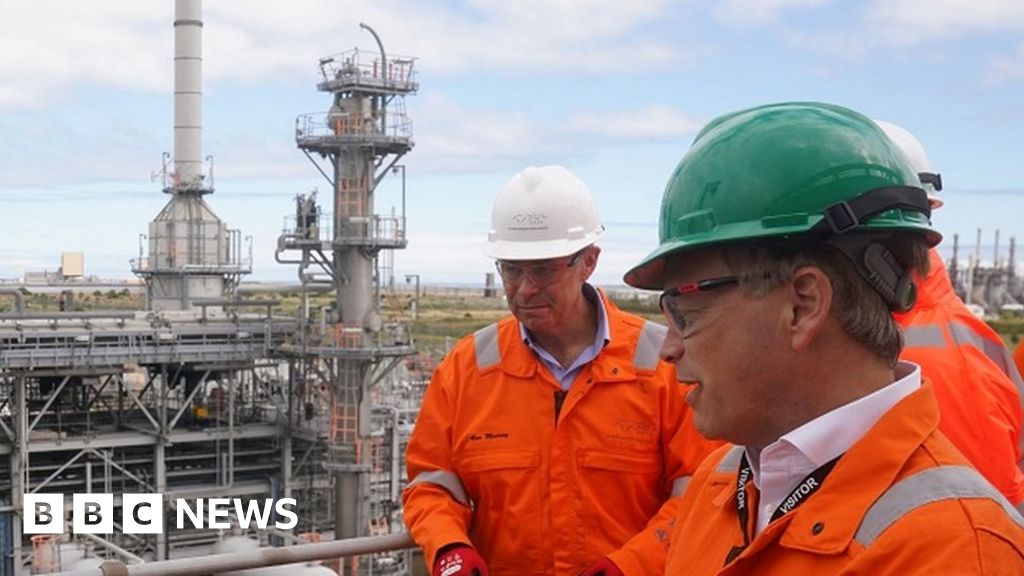Ministers To Speed Up Delivery Of New Power Lines For Clean Energy

Grant Shapps says a report recommending upgrades to the electricity system will be published on Friday
Energy Secretary Grant Shapps has told the BBC the government plans to "halve" the time it takes for more power lines to be built across the UK.
Mr Shapps said a report proposing ways to speed up the construction of electricity cables and pylons would be published on Friday.
The National Grid says five times more power lines need to be built in the next seven years than in the past 30.
But it adds that planning reforms will be required to get them built.
Last July, the government appointed energy expert Nick Winser as the Electricity Networks Commissioner to advise on how this could be done.
The BBC has been told Mr Winser has presented his proposals to Downing Street and they were "well received".
Industry experts widely expect Mr Winser's report to include recommendations on streamlining the processing of planning applications for electricity transmission infrastructure, such as pylons and substations.
The plans could provoke a political backlash in some parts of the country, particularly the East Coast of England and Scotland.
A group of Conservative MPs, including environment secretary Therese Coffey, have campaigned against new electricity pylons being routed through their constituencies in Suffolk and Norfolk.
Many areas likely to be impacted are Tory safe seats in East Anglia, where a network of major wind power projects are trying to bring their clean power onshore.
Dan Poulter, the Conservative MP for Central Suffolk and North Ipswich, said he would continue to oppose plans to build power lines through his constituency.
Mr Poulter told the BBC that while the country needed "to find ways to speed up the construction of new energy projects", he remained against "erecting new electricity pylons across the countryside when there are better options, including offshoring these new energy connections or putting them underground".
Government insiders have said that they were having to work very carefully with MPs from across the House of Commons on their plans.
Mr Shapps told the BBC's World at One programme that he would be issuing Mr Winser's recommendations this Friday along with "some government immediate response".
"The idea is to halve the amount of time it takes to get these connections going," Mr Shapps said.
Mr Shapps's department said the government would welcome Mr Winser's report and set out its response to his proposals at a later date.
Speaking to MPs in June, Mr Winser said he would propose ways to halve the delivery time of electricity projects from 14 to seven years.
Political flash point
Both major political parties have set out energy plans that will require the installation of more overground and underground power lines.
Labour has announced plans to power the UK with "100% clean and affordable power" by 2030. This includes pledges to quadruple offshore wind to 55GW, triple solar power to 50GW, double onshore wind to 35GW, and back Hinkley Point and Sizewell C nuclear power stations.
The government has said it would decarbonise power by 2035, including up to 50GW of offshore wind, 10GW of hydrogen production by 2030, and investment in nuclear power.
The National Grid has said more overground and underground cables are needed to transport more wind, nuclear and solar power - and to respond to a growing demand for electricity as more people use technology such as electric cars.
It says by 2030, it needs to build five times as many transmission lines as have been built in the last 30 years, which would involve reforming the planning system and shortening the application process.
It says decisive action from government, industry and Ofgem is critical to achieve this.
Labour insiders have said "we will do whatever is necessary" if the party wins the next general election.
Shadow climate change and net zero secretary Ed Miliband said: "For thirteen years, the Conservatives have prioritised NIMBY ("Not In My Back Yard") backbenchers who oppose clean power above the interests of the British people.
"Their refusal to tackle delays in the planning system has robbed Britain from heaving cleaner, cheaper power."
The Department for Energy Security and Net Zero said it was "committed to achieving energy security and expanding the capacity of the national grid is crucial to this" but that "delivering this means bringing reform to the planning process and making sure communities feel they are directly benefitting from cheaper, secure, low-carbon energy".
Boosting renewable energy - and the massive infrastructure that comes with it - is likely to be a dividing line between parties in some seats at the next election.
Some renewable infrastructure has caused divisions even among green campaigners - with some Green Party councillors campaigning against solar farms on their local landscape.
From Chip War To Cloud War: The Next Frontier In Global Tech Competition
The global chip war, characterized by intense competition among nations and corporations for supremacy in semiconductor ... Read more
The High Stakes Of Tech Regulation: Security Risks And Market Dynamics
The influence of tech giants in the global economy continues to grow, raising crucial questions about how to balance sec... Read more
The Tyranny Of Instagram Interiors: Why It's Time To Break Free From Algorithm-Driven Aesthetics
Instagram has become a dominant force in shaping interior design trends, offering a seemingly endless stream of inspirat... Read more
The Data Crunch In AI: Strategies For Sustainability
Exploring solutions to the imminent exhaustion of internet data for AI training.As the artificial intelligence (AI) indu... Read more
Google Abandons Four-Year Effort To Remove Cookies From Chrome Browser
After four years of dedicated effort, Google has decided to abandon its plan to remove third-party cookies from its Chro... Read more
LinkedIn Embraces AI And Gamification To Drive User Engagement And Revenue
In an effort to tackle slowing revenue growth and enhance user engagement, LinkedIn is turning to artificial intelligenc... Read more

